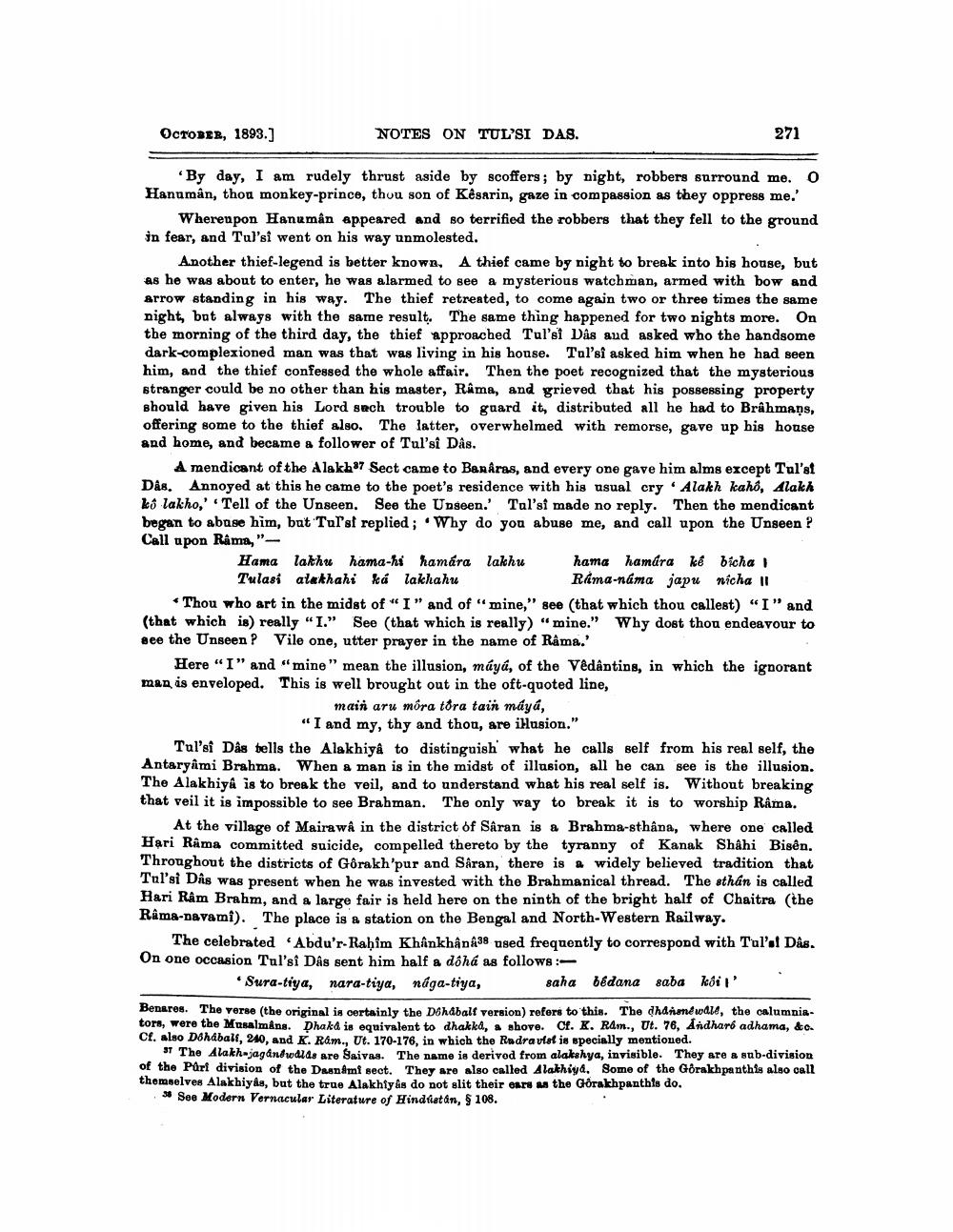________________
OCTOBER, 1893.]
NOTES ON TUL'SI DAS.
271
By day, I am rudely thrust aside by scoffers; by night, robbers surround me. O Hanuman, thou monkey-prince, thou son of Kêsarin, gaze in compassion as they oppress me.'
Whereupon Hanuman appeared and so terrified the robbers that they fell to the ground in fear, and Tulsi went on his way unmolested.
Another thief-legend is better known. A thief came by night to break into his house, but as he was about to enter, he was alarmed to see a mysterious watchman, armed with bow and arrow standing in his way. The thief retreated, to come again two or three times the same night, but always with the same result. The same thing happened for two nights more. On the morning of the third day, the thief approached Tul'si Das aud asked who the handsome dark-complexioned man was that was living in his house. Tol'si asked him when he had seen him, and the thief confessed the whole affair. Then the poet recognized that the mysterious stranger could be no other than his master, Râma, and grieved that his possessing property should have given his Lord such trouble to guard it, distributed all he had to Brâhmans, offering some to the thief also. The latter, overwhelmed with remorse, gave up his house and home, and became a follower of Tulsi Dås.
A mendicant of the Alakh 37 Sect came to Banâras, and every one gave him alms except Tul'st Dås. Annoyed at this he came to the poet's residence with his usual cry Alakh kahó, Alakh ko lakho,' 'Tell of the Unseen. See the Unseen.' Tal'si made no reply. Then the mendicant began to abuse him, but Tul'st replied ; .Why do you abuse me, and call upon the Unseen ? Call upon Râma,”
Hama lakhu hama-hi hamára lakhu hama hamara ke bicha Tulasi alathahi lá lakhahu
Rima-nama japu nicha 11 Thou who art in the midst of "I" and of " mine," see (that which thou callest) "I" and (that which is really "I." See (that which is really) "mine." Why dost thou endeavour to see the Unseen P Vile one, utter prayer in the name of Rama.'
Here "I" and "mine" mean the illusion, máyá, of the Vedantins, in which the ignorant man, is enveloped. This is well brought out in the oft-quoted line,
main aru môra tora tain máyá,
"I and my, thy and thou, are illusion." Tulisi Dâs tells the Alakhiya to distinguish what he calls self from his real self, the Antaryami Brahma. When a man is in the midst of illusion, all he can see is the illusion. The Alakhiya is to break the veil, and to understand what his real self is. Without breaking that veil it is impossible to see Brahman. The only way to break it is to worship Râma.
At the village of Mairawk in the district of Saran is a Brahma-sthana, where one called Hạri Râma committed suicide, compelled thereto by the tyranny of Kanak Shâhi Bisen. Throughout the districts of Gorakh'pur and Saran, there is widely believed tradition that Tulsi Das was present when he was invested with the Brahmanical thread. The sthan is called Hari Râm Brahm, and a large fair is held here on the ninth of the bright half of Chaitra (the Rama-Davami). The place is a station on the Bengal and North-Western Railway.
The celebrated Abdu'r-Rahim Khânkhân 438 used frequently to correspond with Tul'ol Dâs. On one occasion Tulisi Das sent him half a dohá as follows:
"Sura-tiya, nara-tiya, naga-tiya, saha bedana saba kil
Benares. The verse (the original is certainly the Dohabalt version) refers to this. The dhanenê wala, the calumniators, were the Musalmans. Dhakd in equivalent to dhakka, a shove. Of. K. Ram., Ut. 76, Andharó adhama, &c. Cf. also Dohaball, 240, and K. Ram., Ut. 170-176, in which the Rudra viol is specially mentioned.
"The Alakh-jagandwdlds are Baivas. The name is derived from alakshya, invisible. They are a sub-division of the Port division of the Dannámi seot. They are also called Alakhiya. Some of the Gorakhpanthis also call themselves Alakhiyas, but the true Alakhiyâs do not elit their ears as the Gorakhpanthis do.
** See Modern Vernacular Literature of Hindtietan, $ 108.




